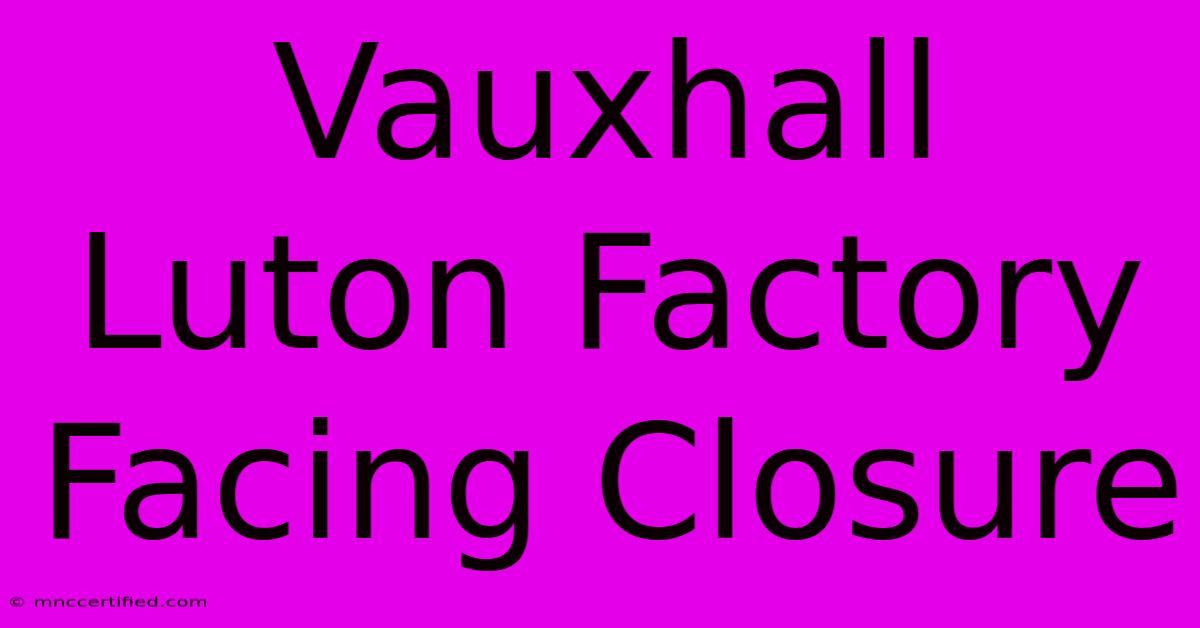Vauxhall Luton Factory Facing Closure

Table of Contents
Vauxhall Luton Factory Facing Closure: What it Means for the UK Auto Industry
The potential closure of Vauxhall's Luton factory is sending shockwaves through the UK automotive industry and beyond. This isn't just about job losses; it's a significant blow to the local economy, a symbol of broader challenges facing the manufacturing sector, and a stark reminder of the complexities of global automotive production. This article delves into the reasons behind the potential closure, its implications, and what the future might hold for Vauxhall and the town of Luton.
Why is the Vauxhall Luton Factory at Risk?
Several interconnected factors contribute to the precarious position of the Luton plant. Firstly, the decline in demand for vans, the factory's primary product, plays a significant role. Changing consumer habits, the rise of electric vehicles, and the global chip shortage have all impacted sales.
The Impact of Electric Vehicles (EVs)
The transition to electric vehicles presents a major challenge. While Vauxhall is investing in EVs, the Luton factory's current infrastructure isn't ideally suited for large-scale EV production. Adapting the factory for EV manufacturing requires substantial investment, which Vauxhall's parent company, Stellantis, may be hesitant to undertake given the current market uncertainties.
Global Supply Chain Disruptions
The ongoing global supply chain crisis has exacerbated existing problems. The shortage of essential components, particularly semiconductor chips, has severely hampered production across the automotive industry, leading to lower output and reduced profitability. This has put pressure on manufacturers to reassess their production strategies, and unfortunately, Luton may be a casualty.
Brexit's Influence
The UK's departure from the European Union has also added to the complexity. Increased trade barriers and tariffs have made it more expensive to import and export goods, impacting Vauxhall's competitiveness in the global market. This adds to the pressure on profitability, making investment in the Luton plant less attractive.
The Consequences of Closure: A Ripple Effect
The potential closure of the Luton plant would have far-reaching consequences.
Job Losses and Economic Impact
The most immediate impact would be the loss of thousands of jobs, not only directly at the factory but also in the wider supply chain. This would have a devastating effect on the local economy of Luton, leading to increased unemployment and reduced economic activity. The knock-on effect on local businesses reliant on the factory would be significant.
Damage to the UK Automotive Sector
The closure would symbolize a further decline in the UK's automotive manufacturing sector, which has already faced numerous challenges in recent years. This could damage the UK's reputation as a hub for automotive innovation and production, potentially deterring future investment in the sector.
Loss of Expertise and Skills
The closure would also mean the loss of valuable expertise and skills within the UK automotive industry. Experienced workers, many with decades of experience, would be forced to seek employment elsewhere, potentially impacting the nation's overall manufacturing capabilities.
What's Next for Vauxhall and Luton?
The future remains uncertain. Stellantis's decisions will be crucial, and potential solutions include:
- Investment in upgrading the Luton factory for EV production: This would require a significant financial commitment but could secure the plant's long-term future.
- Restructuring and streamlining operations: This might involve reducing production capacity or focusing on specific product lines.
- Negotiations with the government and unions: Government support and collaboration with labor unions are vital in exploring options to mitigate job losses and support the local community.
The situation requires a multi-faceted approach involving collaboration between Stellantis, the UK government, local authorities, and workers' representatives. The outcome will significantly impact not only Vauxhall but the broader UK automotive landscape. The story of the Vauxhall Luton factory is far from over, but its future is undoubtedly hanging in the balance.
SEO Keywords Used:
- Vauxhall Luton Factory
- Vauxhall Factory Closure
- Luton Factory Closure
- UK Automotive Industry
- Electric Vehicles (EVs)
- Global Supply Chain
- Brexit Impact on Automotive
- Job Losses
- Economic Impact
- Stellantis
- Vauxhall Future
This article aims to provide comprehensive information while incorporating SEO best practices for improved search engine visibility. Remember to also build off-page SEO by sharing this article on relevant social media platforms and engaging with comments.

Thank you for visiting our website wich cover about Vauxhall Luton Factory Facing Closure. We hope the information provided has been useful to you. Feel free to contact us if you have any questions or need further assistance. See you next time and dont miss to bookmark.
Featured Posts
-
Boomers Beefcake And Bonding
Nov 28, 2024
-
Liverpool Left Back Tsimikas Injured
Nov 28, 2024
-
Photo Of Bonded Csst Gas Pipe
Nov 28, 2024
-
Del Rey Fans Angry Over High Ticket Costs
Nov 28, 2024
-
What Does A Secured Bond Mean
Nov 28, 2024